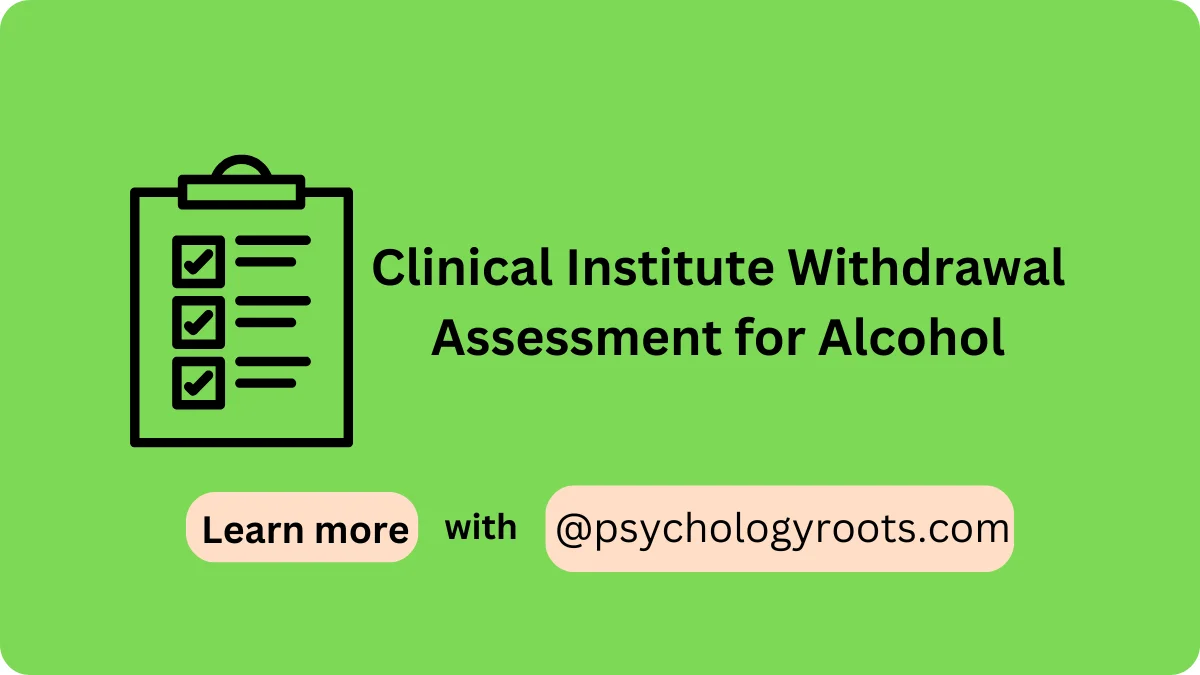Table of Contents
Clinical Institute Withdrawal Assessment for Alcohol
Here in this post, we are sharing the “Clinical Institute Withdrawal Assessment for Alcohol”. You can read psychometric and Author information. We have thousands of Scales and questionnaires in our collection (See Scales and Questionnaires). You can demand us any scale and questionnaires related to psychology through our community, and we will provide you with a short time. Keep visiting Psychology Roots.
About Clinical Institute Withdrawal Assessment for Alcohol
Scale Name
Clinical Institute Withdrawal Assessment for Alcohol
Author Details
John T. Sullivan, Kathy Sykora, Joyce Schneiderman, Claudio A. Naranjo, and Edward M. Sellers
Translation Availability
English

Background/Description
The Clinical Institute Withdrawal Assessment for Alcohol Scale, Revised (CIWA-Ar), developed by Sullivan et al. (1989), is a 10-item clinician-administered scale designed to quantify the severity of alcohol withdrawal syndrome in adults. Published in the British Journal of Addiction, the CIWA-Ar assesses symptoms including nausea/vomiting, tremor, paroxysmal sweats, anxiety, agitation, tactile disturbances, auditory disturbances, visual disturbances, headache/fullness in head, and orientation/clouding of sensorium. It is a shortened, improved version of the original CIWA, enhancing efficiency while retaining clinical utility for symptom-triggered treatment, particularly with benzodiazepines.
Clinicians rate each item based on observation and patient interview, using a scale from 0 (no symptoms) to 7 (severe symptoms), except for orientation (0–4). Total scores range from 0–67, with cutoffs: ≤10 (mild withdrawal), 11–15 (moderate), and ≥16 (severe, with risk of delirium tremens). The CIWA-Ar was validated with 39 patients (mean age ≈ 40 years, mostly male, Canada-based), showing that 80–90% of scores guided appropriate benzodiazepine dosing. It correlates with physiological measures like heart rate (r ≈ 0.50–0.70) and the Addiction Severity Index (r ≈ 0.40–0.60). The scale is used in clinical psychology, addiction medicine, and hospital settings to assess withdrawal severity, guide treatment, and monitor progress. It is freely available and takes less than 2 minutes to complete.
Administration, Scoring and Interpretation
- Obtain the scale from Sullivan et al. (1989) or authorized sources (e.g., British Journal of Addiction, National Center for PTSD), ensuring ethical permissions.
- Explain to participants (adults with alcohol withdrawal) that the clinician will assess withdrawal symptoms via questions and observation, emphasizing confidentiality and voluntary participation.
- Administer the 10-item scale in a clinical setting via a semi-structured interview and observation, rating symptoms based on the past 24 hours.
- Estimated completion time is 1–2 minutes.
- Ensure a private, supportive environment; provide medical resources (e.g., addiction helplines) and adapt for accessibility (e.g., interpreter for language barriers) if needed.
Reliability and Validity
The CIWA-Ar demonstrates strong psychometric properties (Sullivan et al., 1989). Internal consistency is high (Cronbach’s alpha ≈ 0.85–0.93), and inter-rater reliability is robust (r ≈ 0.90–0.95), based on samples of 39–135 patients. Test-retest reliability is not explicitly reported but inferred as high (r ≈ 0.80–0.90 over short intervals) from clinical use.
Convergent validity is supported by correlations with the Addiction Severity Index (r ≈ 0.40–0.60) and physiological indicators (e.g., blood pressure, r ≈ 0.50–0.70). Criterion validity is evidenced by its ability to predict benzodiazepine needs and detect severe withdrawal (sensitivity ≈ 0.85–0.90 for scores ≥16).
Factorial validity is not detailed but implied by its focus on withdrawal symptoms. Limitations include subjectivity in 7 items requiring patient input, which may be unreliable with language barriers or severe intoxication. Pairing with objective measures like the Objective Alcohol Withdrawal Scale or Breathalyzer enhances assessment.
Available Versions
Multiple-Items
Reference
Sullivan, J. T., Sykora, K., Schneiderman, J., Naranjo, C. A., & Sellers, E. M. (1989). Assessment of alcohol withdrawal: the revised clinical institute withdrawal assessment for alcohol scale (CIWA‐Ar). British journal of addiction, 84(11), 1353-1357.
Important Link
Scale File:
Frequently Asked Questions
What does the Clinical Institute Withdrawal Assessment for Alcohol Scale measure?
It measures the severity of alcohol withdrawal symptoms, including physical and psychological signs.
Who is the target population?
Adults experiencing alcohol withdrawal.
How long does it take to administer?
Approximately 1–2 minutes.
Can it inform interventions?
Yes, it guides symptom-triggered benzodiazepine treatment and monitors withdrawal progress.
Disclaimer
Please note that Psychology Roots does not have the right to grant permission for the use of any psychological scales or assessments listed on its website. To use any scale or assessment, you must obtain permission directly from the author or translator of the tool. Psychology Roots provides information about various tools and their administration procedures, but it is your responsibility to obtain proper permissions before using any scale or assessment. If you need further information about an author’s contact details, please submit a query to the Psychology Roots team.
Help Us Improve This Article
Have you discovered an inaccuracy? We put out great effort to give accurate and scientifically trustworthy information to our readers. Please notify us if you discover any typographical or grammatical errors.
Make a comment. We acknowledge and appreciate your efforts.
Share With Us
If you have any scale or any material related to psychology kindly share it with us at psychologyroots@gmail.com. We help others on behalf of you.